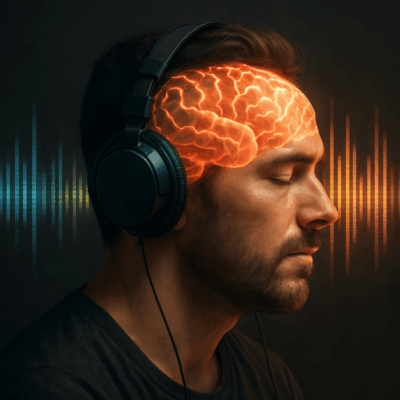Music has long been a universal language — it transcends borders, connects generations, and evokes powerful emotions. But beyond its emotional impact, music has a direct effect on the human brain. Neuroscientists, psychologists, and music therapists have studied the complex relationship between music and the mind, and the results are fascinating.
Music and Brain Chemistry
Listening to music stimulates the release of dopamine, a neurotransmitter associated with pleasure and reward. This is the same chemical that gets triggered when you eat your favorite food or achieve a goal. In a study published by Nature Neuroscience, researchers found that people experienced peak dopamine release during their favorite parts of a song.
This helps explain why certain songs can give you chills — your brain is literally experiencing a high from the music.
The Brain on Rhythm and Melody
The amygdala, a center for emotions, is activated when we listen to music that resonates emotionally.
Even the prefrontal cortex, responsible for decision-making and self-control, is engaged during musical experiences. This multi-area activation explains why music can have such a profound impact on our thoughts and feelings.
Music and Memory
Music is a powerful trigger for memory. That’s why hearing an old song can instantly transport you back to a specific moment in your life. For people with Alzheimer’s disease or dementia, music therapy has shown incredible potential.
A study from The Journal of Music Therapy revealed that patients who listened to familiar music from their past had increased cognitive function and reduced agitation. Music doesn’t just activate memories — it helps preserve them.
Music’s Role in Emotional Regulation
One of the most researched areas in music and brain science is emotional regulation. People often use music to manage moods, whether it’s listening to upbeat tracks while working out or soothing instrumentals during moments of stress.
In one study conducted by the University of Missouri, participants who intentionally listened to happy music were able to improve their mood in just two weeks. This suggests that music can be a practical, non-invasive tool for boosting emotional well-being.
Music and Brain Development in Children
Children who are exposed to music early on — especially those who learn to play an instrument — often show advanced brain development. A study by the Harvard Medical School found that music training enhances verbal memory, spatial reasoning, and literacy skills.
Even passive exposure to music in the womb has shown benefits. Pregnant mothers who played music reported that their babies responded with movement, and some studies suggest these early experiences may contribute to better cognitive development later in life.
Music Therapy and Mental Health
Music therapy is an established treatment method for mental health issues like depression, anxiety, PTSD, and even schizophrenia. Trained music therapists use rhythm, melody, and improvisation to help patients express emotions, reduce stress, and process trauma.
The American Music Therapy Association highlights numerous case studies where music therapy improved communication skills in autistic children and helped veterans cope with post-traumatic stress.
The Mozart Effect: Fact or Fiction?
You may have heard of the Mozart Effect, the idea that listening to classical music, especially Mozart, can make you smarter. While the original study from 1993 showed that students performed better on spatial reasoning tests after listening to Mozart, later research found the effect to be short-term.
Nonetheless, the concept helped increase interest in early childhood music education and underscored the potential cognitive benefits of musical exposure.
Music and Physical Health
Surprisingly, music also has an impact on physical health. It has been shown to:
- Reduce pain in post-operative patients
- Lower heart rate and blood pressure
- Improve sleep quality
- Aid in stroke recovery
One study published in The Lancet concluded that patients who listened to music before, during, or after surgery had lower anxiety levels and required less medication.
Personalized Music and Future Applications
Thanks to advances in technology, personalized music therapy may soon become a mainstream treatment. AI can already analyze an individual’s brainwaves and create custom soundscapes to induce relaxation, focus, or sleep.
Imagine a future where your smartwatch detects stress and automatically plays a playlist designed to soothe your nervous system.
Final Thoughts: A Symphony in the Brain
The human brain and music share a deep, intricate relationship. From sparking emotion and memory to improving mental and physical health, music truly is medicine — and more than that, it’s a mirror reflecting our deepest selves.
As science continues to explore this rich connection, one thing is clear: music doesn’t just entertain us — it transforms us.

